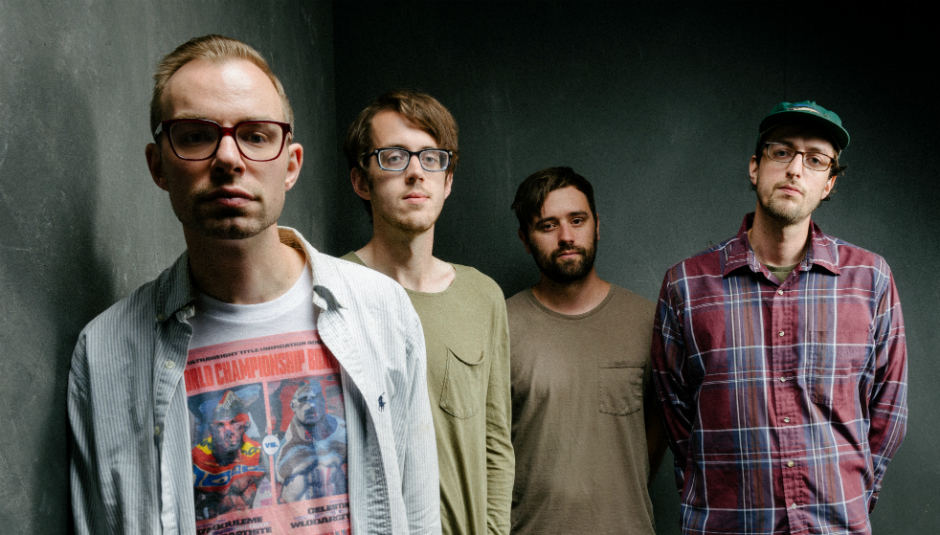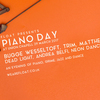It’s the kind of bitterly cold winter night that London specialises in, cutting through to your bones until you half-expect them to be covered in frost. Fortunately, my destination is Strongroom, both something of an indie music hallowed ground and, crucially, somewhere which isn’t outside.
Inside, there’s a battered brown leather sofa that proves the perfect foil to its occupant: a rangy, wild haired and healthily bearded twenty-something. Cloud Nothings’ Dylan Baldi to be exact. He’s here to nurse a glass of red wine and talk about Life Without Sound, the exceptional follow-up to 2014’s rapturously received Here And Nowhere Else.
Refreshingly frank and honest, especially about his own work, Baldi’s laidback demeanour makes almost everything that happens to him sound like an accident (happy or otherwise).
If that’s the case though, the frequency and pattern of these accidents has begun to suggest something else at work; that in the course of seven years Baldi has blossomed from a lo-fi buzz artist with an undeniable instinct for a hook, to one of indie rock’s most dedicated and consistently excellent songsmiths.
DiS: Where Attack On Memory and Here And Nowhere Else felt very much like a natural progression from one another, with your sound growing tighter and heavier, I’ve got to admit Life Without Sound threw me a tad the first time I heard it.
Dylan Baldi: Right.
The overall vibe musically is of a lighter, not quite sunnier but certainly less intense, listen. It really made me reappraise what I thought your band was. So I went in search of context, starting with your very first releases and worked my way back through before listening to Life Without Sound again. The realisation I got to? “I see how he got here.”
Does it feel like that for you?
A full circle sort of thing? I’ve never really thought about it like that – at least I hadn’t with this record yet – but people have been telling me that, so maybe subliminally there’s a been a return to 18 year old me or something! But it wasn’t quite on purpose. I wanted to do something different than the last couple of records, which are different to each other too. Somehow the songs just ended up being a little… slower, and – not happier – but expressing more of a range of emotion.
There’s an interesting thread with your last few album titles. Attack On Memory and Here And Nowhere Else both to speak to an almost ‘End of History’ perspective, very much focused on dealing with the now. Is Life Without Sound a continuation of that, or a split from that way of thinking?
It feels like a continuation, yeah. As you say, Attack On Memory and Here And Nowhere Else were a continuation and this one just keeps that moving on.
The album title is a lyric in one of the songs that encompasses the album as a whole really because it’s about… finding things that you didn’t quite know you were missing, and getting used to those and coming to terms with those, by either continuing to miss it or finding ways to include those things in your life more and become a little happier with where you are and what you’re doing.
Is a Life Without Sound a life at all?
No, not really; that’s what I mean, it’s a missing sense, something that you come to find and you realise: “Oh… what was I doing? [laughs] Where was this thing before?” Y’know: “I’ve just found about sound!”
“What’s sound? I’ve done four albums!”
“I haven’t heard anything!”
It’s particularly interesting as this is the longest break you’ve had between Cloud Nothings records…
Definitely.
…Whereas your career has been marked so far by being – do take this the right way – almost horrendously prolific.
[laughs] Brutally productive.
Part of what was so great about Here And Nowhere Else, was what might have made it a dangerous record for you to make personally, in that it was a very intense, really focused period of time.
It was pretty wild. We had a month where me and my drummer Jayson [Gerycz] could really get together everyday and be like: “OK, let’s try to figure out what the fuck’s going on”, because we had to record the next month. “Uh oh!” y’know? So, we spent a month of serious…you know, a lot of work in that month, but it was just a month. Whereas, this one was…slowly, over the course of a year.
A nice change.
It was nice, yeah.
That feels mirrored in the production of the record. Previously, you’ve had Steve Albini and John Congleton who are both known for intensity, whereas John Goodmanson’s track record has a different pacing to it. Do you go to producers to reflect a sound you want to achieve, or do the producers make the sound happen?
They make the sound happen for us, I guess. Every producer we’ve had so far, someone has said: “How about you go record with that guy?” and I’m just like “Okay!” I don’t really think about it. But I do want to work with somebody different with every record, because I do like having a different sound.
We work with people who have pretty strong opinions on what things should sound like and generally we just go with them. We have the songs, we record the songs, but whatever that person is thinking in terms of mixing, we go with. They don’t do much in terms of writing at all, but just in terms of the way the record’s going to sound, that’s their job; I don’t know how to do that. So we hire somebody who knows what they’re doing.
It’s not dissimilar to what you have in hip-hop or pop in particular, where you have these almost celebrity producers.
Somebody else was just telling me that, so I guess we do! I haven’t thought about it like that. I didn’t realise Goodmanson was so renowned actually when we started working with him, I didn’t really know who he was.
It must be better to go in completely blind, because you don’t go in with any expectations.
Yeah, you’re right, I didn’t. We went for three weeks and that’s longer than we’ve every taken on any record, so it could have gone terribly [laughs], but it worked out.
You posted the lyrics to ‘Modern Act’ on Instagram when the song was released, which is pretty significant in this era of RapGenius where people are left to their own devices. It means there’s a definitive statement from the artist.
Yeah, this was the first record where we actually had like a lyric sheet with the record, because I would read stuff where people were reviewing the record and they’d have the lyrics wrong and I’d be like “What? Come on!” So now it’s like: “There’s no excuse, I gave them to you, you have to have them right!”
Not you, personally of course.
Likewise, in the mix on the record, your voice is more confident sounding. It’s more present. Do you feel like that’s the case, that you’re a more confident singer?
I wanted to sound more confident, because we do the vocals last when we record. So all the music was there and it sounded really big and confident. So I thought: “If I just kind of mumble that’s going to sound like shit, so I guess I have to actually sing.” So it was a last minute decision in a way and I didn’t know if I could do that, but it worked out!
It marries with the lyrics sheet then – if you’re more confident in what you’re saying then you can be more confident in how you’re saying it.
Yeah, I took more time on the lyrics than in the past; it’s a little more narrative than the other records have been.
Across the album?
Even just within individual songs. ‘Enter Entirely’ is a story which is something I’ve never done before. ‘Modern Act’ is like that too; it’s a new thing.
On ‘Realize My Fate’ you talk about “I believe in something bigger”, but you don’t quite get there in terms of what that is within the narrative of the song, you talk about the need for it. Your music has historically always been very personal, so therefore the politics are of the ‘personal’ rather than the world outside you. With that lyric however, it feels like you’re stretching into the world outside of yourself.
I guess so.
Especially in the current climate, do you find yourself writing about the world more?
I don’t feel a responsibility for Cloud Nothings to be a political band, but I can be a political person.
If I’m listening to a record, I’m not listening to it because the artist is liberal and writing about that, I’m not thinking about that; I’m listening to the music on the record. So if I like the music, I like the record. So when I’m making a record I’m thinking strictly about music. The lyrics are important to me, but it’s not what a record is about; a record is about sound and the way the sounds make me feel, rather than any overt message.
I think, in our press release it kind of implies that we meant “bigger” in terms of the world, but I don’t think I did. Which is no big deal; if it says something I didn’t want to say, then I’ll just talk about it later!
You’ve had a couple of black-and-white sleeves, and this time whilst it’s still a monotone image, it’s blue.
It is blue.
The photograph is looking out to sea again, similar to Attack On Memory where you’re looking out towards a lighthouse, which conjures all the connotations that come with lighthouses: safety, security, shipwrecks, danger…This however, looks gorgeous. Where was it taken?
Jamaica. I went there for a week with my girlfriend, and that was actually the only picture I took while I was there. There actually used to be a little lady on the rock by the umbrella, but we got rid of her, photoshopped her out! But the dude left her shadow in there, so there’s a shadow on the rock, which is accidental, and I didn’t realise until later.
That’s an interesting Easter Egg.
Yeah, I can read into it, make up a story about why that is.
Life Without People.
[Laughs].
You mentioned when Attack On Memory came out that you didn’t want to play any of the old songs any more, which makes sense with the dramatic change in the music’s flow. Is that still the case this time round as you put the set-lists together?
It will probably still be the most recent stuff, we won’t go back too far. Even though this stuff is a little lighter, it fits in the set that we have right now.
Whilst on the record it sounds perfect, when we play live it doesn’t always sound like that; we’re not perfect. When we just play these songs and there’s not five guitar-tracks, it does still sound like one of the old records, it fits in the set really well.
The last record you recorded pretty much live.
Almost like fully, totally live.
As you had three weeks and mention “five guitar-tracks”, I take it that wasn’t the case this time round.
No, we recorded it live and then went back and re-did it. We kept the drum track and did bass over that again, changing the bass sound on some of the songs – which we’ve never done. “Different bass sounds?!” Just crazy, so crazy.
The guitars we spent a long time on, because the studio we were at just had so many different guitars and amps that we were just like “Well, gotta use them all!” But there was just more of a focus on making each song it’s own world on this one, rather than on previous records where it was a record-long vibe, whereas this one shifts a little bit.
If Cloud Nothings ever did a live album, it would probably sound remarkably similar to Here And Nowhere Else.
Probably, yeah. That was a pretty grey record, one tone, one sound, pretty aggressive. Which is cool and I like that, but I don’t feel like that any more; I don’t want to try and make a record like that.
It allows more room for production tricks, the last two songs flow together really nicely, which requires some clever mixing. Even things like the use of piano, which makes a comeback on this record; it’s the first thing we hear on Life Without Sound, which feels like a very deliberate choice after a more aggressive record.
I want every record to be a reappraisal of the band. That’s more interesting to me than making something where you’re like: “Oh, I know what that’s like. Another Cloud Nothings record? Oh boy.” I like it to be different every time, because that’s interesting to me and I don’t get bored and I assume it’s interesting to other people.
Do you read stuff about your band?
Occasionally I do. Fortunately people are usually pretty nice to us. It’s not very often that I read something and re-think my whole life. I try not to put too much thought into it.
It’s interesting given that at the start, Cloud Nothings was you, whereas this time round you know, you’re back to being a full band with another guitarist.
Yeah, there’s another guy now.
Did that happen before or after the recording process?
It was after, because we recorded and I added another guitar to every song, so we needed another guy. Plus, all the Attack On Memory stuff just sounds better with two guitars rather than me trying to desperately play both parts at once.
To the point earlier on the singing, does another guitarist free you up to focus on the signing more?
I can definitely focus more, which is something I hadn’t done before; it felt like I was just talking at different pitches, which isn’t really singing [laughs], I don’t know what that is! Just about Mark E. Smith.
Or rapping?
Yeah rapping. Maybe I’m rapping.
I read that you were talking about collaborating with Danny Brown. Is that true?
Oh [laughs]. Yeah, I don’t really know how true it is, but I did meet him one time and he said that one of our songs [‘Fall In’] sounded like Wu-Tang Clan. So I was like, “Would you ever like to do something sometime?” and he was like “Yeah!”, but that was a super-quick conversation at SXSW, so who knows how real that was. He probably doesn’t remember that. I remember it because it was so crazy, because I like love Danny Brown.
His new record’s amazing.
Dude, it’s so good I can’t believe it.
Didn’t see it coming.
Yeah, after the last record, which was very trap, I thought he’d keep it going in that direction. But this one’s weird, it’s so good. It’s so dark, all the stuff he’s saying. He must have had a hard time the last couple of years.
You do something different with all the albums, do you try to top yourself in terms of songs?
I want every record to be different but also have a little more girth to it than the previous one, a little more to dig into and think about, so that’s what I try to do. If that actually comes across, who knows, but there’s definitely an attempt there, so an A for effort at least.
That’s all the reviews: “A for effort… C for execution.”
Totally. By the way, does your copy have two minutes of silence at the end of ‘Realize My Fate’?
Yeah, it’s over seven minutes long on mine. Is it not meant to be?
It’s meant to be five minutes, but someone’s just pointed out that two minutes of it are just nothing, and that’s an accident. But maybe it’s a statement, like the shadow on the sleeve.
Creative silence. Think about it.
Life Without Sound is out now via Wichita Records. For more information on the band, including upcoming tour dates, please visit their official website.
Photo Credit: Jesse Lirola






















